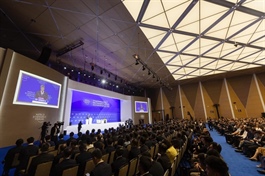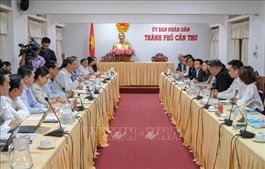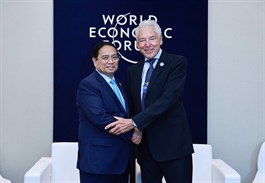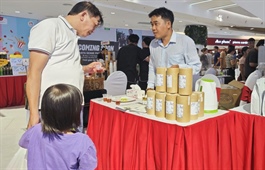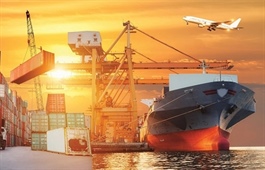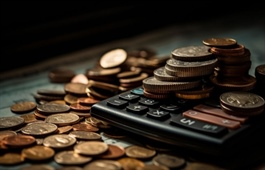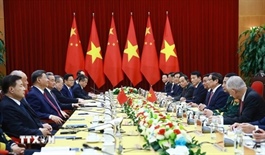Uncertain economy weighs on sentiment
Uncertain economy weighs on sentiment
Foreign direct investment into Vietnam has been robust so far this year, but the cloudy global economy equals an uncertain second half.
In mid-June, Syre, a subsidiary of Swedish fashion retailer H&M, received a registration certificate for its large-scale polyester recycling and production complex, worth around $1 billion in the south-central province of Binh Dinh. The complex is designed with an annual capacity of 100,000-250,000 tonnes of PET pellets. The venture is slated to be put into operation by 2029.
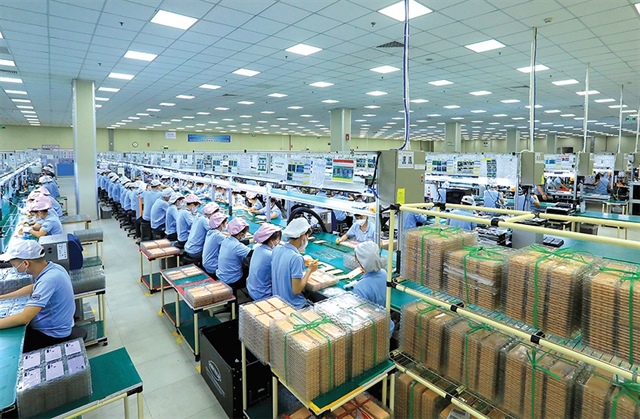
Ongoing reforms could be a catalyst for operations in areas like manufacturing, Photo: Le Toan |
Syre CEO Dennis Nobelius said, “Syre has an ambition to support Vietnam in its green transition and as a global leader in the circular textiles industry. The partnership with Binh Dinh province will, with the right conditions in place, be a great opportunity to jointly lead the textiles shift.”
Also in the same month, Beligum’s One Refractories signed a lease agreement with the Long Duc Industrial Park for a 2,000sq.m factory in the southern province of Dong Nai. This project not only represents One Refractories’ first investment in Vietnam, but also its first operational footprint in Asia.
Founded in Belgium in 1925, the company’s products are applied across core industries, including cement, steel, iron, and more.
Charles Henri Muller, general manager at One Refractories Asia, said, “This marks a significant milestone as we establish our first plant in Asia. This strategic move reflects our commitment to growth, innovation, and closer collaboration with our regional partners, contributing to Vietnam’s dynamic industrial landscape.”
In late May, Avery Dennison, a materials science and digital ID solutions company, opened its joint venture apparel manufacturing facility in Ho Chi Minh City with garment manufacturer Shenzhou Group.
With total funding of $4.7 million, the facility has a processing capacity of up to 800,000 labels per day. It specialises in producing a diverse range of apparel and digital identification products.
According to the Foreign Investment Agency under the Ministry of Finance, registered foreign direct investment (FDI) commitments surged 51 per cent to $18.4 billion in the first five months of 2025. Injections into existing projects jumped almost 3.5-fold from a year ago to $8.51 billion. Newly registered capital fell by a narrower over 13 per cent in value terms to $7 billion, but the number of new projects rose 14 per cent.
According to George Xu, director in Fitch Ratings’ Asia-Pacific Sovereigns team, the strong FDI pledges recorded in the first five months of 2025 indicate Vietnam remains a favourable destination for many foreign backers seeking to diversify and expand their production operations amid ongoing geo-economic fragmentation.
“However, the growth in actual FDI disbursement in the country moderated over this period. Some leading indicators point to softer external demand for new orders ahead, which may reflect heightened uncertainty surrounding global trade policies and the endpoint for US tariffs, weighing on sentiment,” Xu said.
Chua Hak Bin, an economist at Maybank Investment Banking Group, said the surge in FDI suggests that confidence in Vietnam remains strong despite elevated global economic uncertainty.
“One plausible catalyst would be ongoing institutional reforms to improve the business and an increased impetus to diversify operations to Vietnam amid the recent escalation in US-China trade tensions. Besides manufacturing, the real estate sector continues to receive strong interest,” Bin said.
New research by the World Bank indicates that further reconfiguration of global value chains will likely be accompanied by a shift in FDI to alternative locations, possibly including the source economies. For example, US firms have recently diverted some investment from China to Mexico and Vietnam, while US-based multinationals in some sectors, such as semiconductors, plan to establish more activity within the US.
Meanwhile, Fitch Ratings expects the potential impact to be uneven across sectors after Vietnam’s tariff negotiations with the US. Those that operate on thin margins, such as exporters in the garment and textiles sector, are more vulnerable to losing competitiveness.
- 08:00 26/06/2025





